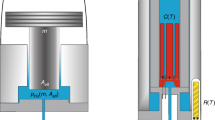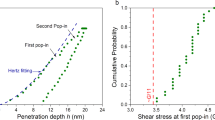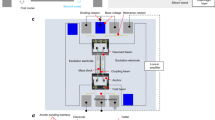Abstract
THE measurement of pressures of the order of 10,000–200,000 bars and upward on uniaxial pressure transmitting devices is a formidable problem. At present, inter-laboratory comparison of results obtained at ultra-high pressures is not satisfactory. The availability of a convenient pressure calibration substance that is useful over a wide temperature-range, and the agreement on a satisfactory scale of pressure based on this calibration substance, are imperative for future work.
This is a preview of subscription content, access via your institution
Access options
Subscribe to this journal
Receive 51 print issues and online access
$199.00 per year
only $3.90 per issue
Buy this article
- Purchase on Springer Link
- Instant access to full article PDF
Prices may be subject to local taxes which are calculated during checkout
Similar content being viewed by others

References
Bridgman, P. W., and Simon, I., J. App. Phys., 24, 405 (1953).
Dachille, F., and Roy, R., Z. Krist., 111, 451 (1959).
Cohen, H., and Roy, R., J. Amer. Cer. Soc. (in the press).
Author information
Authors and Affiliations
Rights and permissions
About this article
Cite this article
ROY, R., COHEN, H. Effects of High Pressure on Glass: a Possible Piezometer for the 100-Kilobar Region. Nature 190, 798–799 (1961). https://doi.org/10.1038/190798a0
Issue Date:
DOI: https://doi.org/10.1038/190798a0
This article is cited by
-
First-principles molecular dynamics simulations of anorthite (CaAl2Si2O8) glass at high pressure
Physics and Chemistry of Minerals (2018)
-
Effect of high pressure on chalcogenide glasses
Bulletin of Materials Science (1985)
-
Strained mixed-cluster model for glass structure
Nature (1975)
-
Untersuchungen an Riesgl�sern
Beitr�ge zur Mineralogie und Petrographie (1965)
-
High-pressure Densification of Glass and the Effects of Shear
Nature (1963)
Comments
By submitting a comment you agree to abide by our Terms and Community Guidelines. If you find something abusive or that does not comply with our terms or guidelines please flag it as inappropriate.


